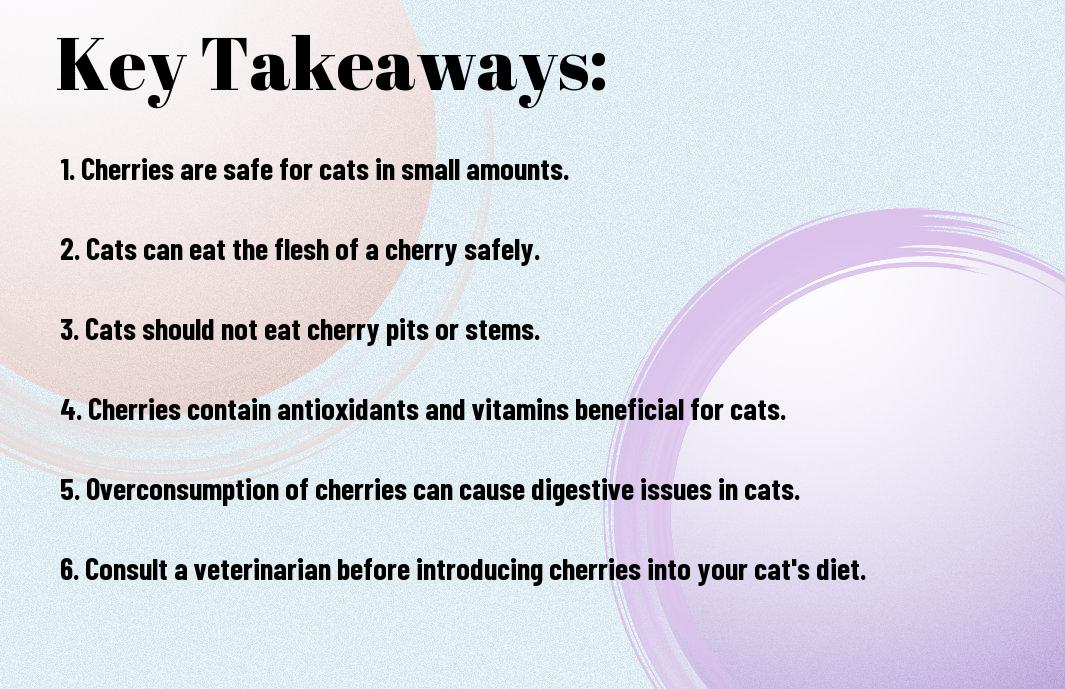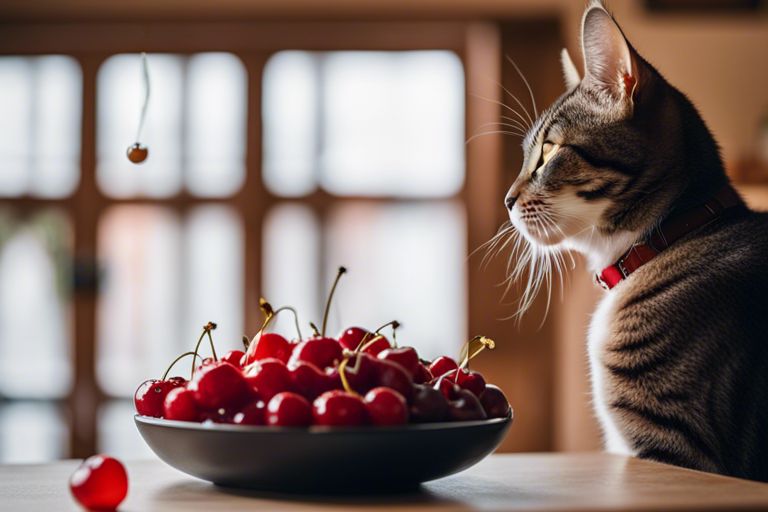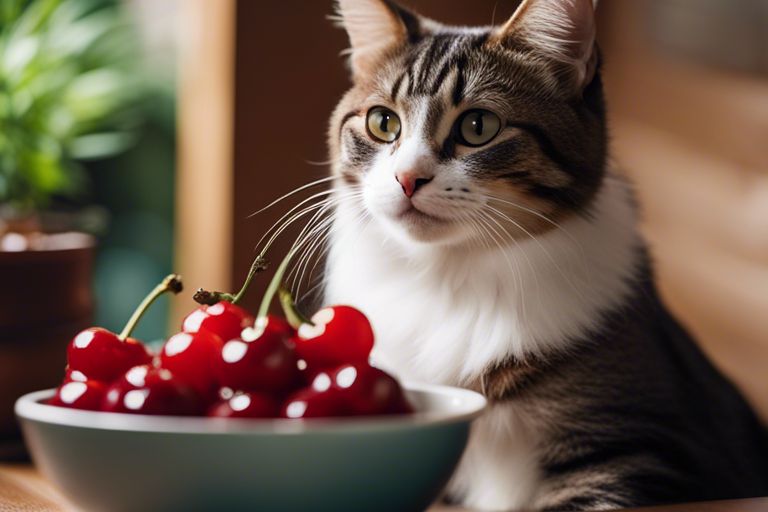Curious cat owners often wonder if their feline friends can partake in the delicious fruit that is cherries. While cherries may seem harmless to eat, it’s important to be aware of whether they are safe for your cats to consume. In this informative blog post, we will explore the potential risks and benefits of allowing your cats to eat cherries, and offer expert advice on whether it is safe for them to do so.

Understanding Cats and Their Dietary Needs
Any cat owner knows that their feline friends can be quite picky when it comes to food. But it’s not just a matter of being finicky; cats have specific dietary requirements that need to be met in order to keep them healthy and thriving. Understanding these needs is crucial for providing the best care for your beloved pet.
General Dietary Requirements of Cats
Any cat’s diet should consist primarily of protein, with a smaller portion of fats and a minimal amount of carbohydrates. This is due to their natural physiology as obligate carnivores, which means that they require nutrients found in animal tissue to thrive. In addition to these macronutrients, cats also need a range of vitamins and minerals to support their overall health.
The Carnivorous Nature of Felines and its Impacts on Diet
Carnivorous animals, such as cats, have a digestive system that is specifically designed to process and derive nutrients from animal-based sources. Their bodies are not equipped to efficiently digest plant-based foods, and as a result, a diet high in these foods can lead to a range of health issues. This is why it’s crucial for cat owners to provide their pets with a diet that closely mimics what they would consume in the wild.
To ensure that your cat is receiving the proper nutrition, it’s important to choose a high-quality cat food that is rich in animal-based protein and free from unnecessary fillers and additives. This will help support their overall health and well-being, reducing the risk of health issues such as obesity, diabetes, and digestive problems.

The Pros and Cons of Cherries for Cats
Some important information to consider when it comes to feeding cherries to your cats is the potential benefits and potential hazards. In order to make an informed decision, it’s crucial to be aware of both the positive and negative aspects of sharing cherries with your feline companion.
| Potential Benefits | Hazards and Toxic Components |
| Rich in antioxidants | Pits contain cyanide |
| May help with inflammation | Potential for digestive upset |
| Good source of vitamins A and C | Risk of choking hazards |
| Potential to strengthen immune system | Possible allergic reaction |
Potential Nutritional Benefits
With their high levels of antioxidants, cherries have the potential to benefit your cat’s health. Antioxidants can help to neutralize damaging free radicals in the body, which may contribute to improved immune function and overall well-being for your feline friend. Additionally, cherries are a good source of vitamins A and C, which are essential for maintaining a healthy immune system and promoting good vision.
Hazards and Toxic Components in Cherries
For all their potential benefits, cherries also come with some risks for cats. The pits of cherries contain cyanide, which can be toxic to cats if ingested. Moreover, the pits pose a choking hazard, and the flesh of the fruit may lead to digestive upset in some cats. There is also the possibility of allergic reactions in some felines.
Cherries can pose a danger to cats due to their cyanide-containing pits and potential for digestive upset. This makes it important to exercise caution and carefully consider the risks before introducing cherries into your cat’s diet. It’s always recommended to consult with a veterinarian before offering any new food to your cat, particularly ones that may pose potential risks.

Safe Practices When Feeding Cherries to Cats
To ensure the safety of your feline friend, it’s important to follow safe practices when feeding cherries. While cherries can be a delicious treat for humans, they can pose potential risks to cats if not handled properly. By following these guidelines, you can help prevent any adverse effects and ensure a safe experience for your cat.
How to Properly Prepare Cherries
Practices for preparing cherries for your cat should include removing the pits and stems before offering them as a treat. Cherry pits contain cyanide, which is toxic to cats, and can pose a choking hazard. Additionally, the stems can be a choking hazard and should be removed as well. It’s also important to only offer fresh, ripe cherries to your cat, as spoiled fruit can cause digestive issues.
Recommended Quantities and Frequency
Safe feeding practices for cherries involve offering them to your cat in small, infrequent quantities. While cherries can be a tasty treat, they should not make up a significant portion of your cat’s diet. Feeding cherries in moderation is key to preventing any potential digestive upset or other adverse effects.
With these safe practices in mind, you can provide your cat with the occasional cherry treat without compromising their health. It’s essential to remember that cherries should not be a staple in your cat’s diet and that safe preparation and limited quantities are crucial for their well-being.
Alternatives to Cherries in a Cat’s Diet
Your cat’s diet doesn’t have to be limited to cherries. While some cats may enjoy the occasional cherry, it’s important to remember that they are not safe for consumption. If you’re worried about whether your cat has ingested cherries or any other fruit, you can find more information on this Quora thread: My cat ate a cherry yesterday. Do cats usually like fruit?
Safe Fruit Options for Cats
Safe fruit options for cats include small amounts of bananas, blueberries, and watermelon. These fruits should be cut into small, bite-sized pieces and given as an occasional treat rather than a regular part of their diet. Remember that moderation is key when it comes to feeding fruits to your cat, as they are not obligate fruit eaters like some other animals.
Other Treat Recommendations
For other treat options, consider commercial cat treats specifically designed for feline consumption. These treats are formulated to meet your cat’s nutritional needs and are a safer and more reliable option than human food. Additionally, you can offer cooked and unseasoned meats such as chicken or turkey as a special treat for your cat.
Any unfamiliar treat should be introduced gradually to monitor your cat’s reaction and prevent any potential digestive issues. Always consult with your veterinarian before making any significant changes to your cat’s diet.
Can Cats Eat Cherries? Is It Safe For My Cats?
Hence, it is not recommended to feed cherries to your cats. While the fleshy part of the cherry may not be toxic to cats, the seeds and stems contain cyanide which can be harmful if ingested in large amounts. Additionally, the pits can pose a choking hazard for your feline friend. It’s best to stick to cat-friendly fruits and treats to ensure the health and safety of your pet. Always consult with your veterinarian before introducing any new food into your cat’s diet.
FAQ
Can cats eat cherries?
No, cats should not eat cherries. Cherries contain cyanide, which is toxic to cats. The pits and stems of cherries also pose a choking hazard and can cause intestinal blockages. It is best to keep cherries and cherry products away from your feline friends.
What happens if my cat eats cherries?
If your cat ingests cherries, it can lead to cyanide poisoning, which can cause symptoms such as difficulty breathing, dilated pupils, and red gums. In severe cases, it can be fatal. If you suspect that your cat has eaten cherries, contact your veterinarian immediately.
Are there any safer alternatives for my cat to enjoy instead of cherries?
Yes, there are plenty of cat-friendly fruits and vegetables that you can offer to your cat as a treat. Some safe options include small amounts of cooked or steamed carrots, green beans, or cucumber. Always consult with your veterinarian before introducing any new foods to your cat’s diet.

Understanding Cats and Their Dietary Needs
Any cat owner knows that their feline friends can be quite picky when it comes to food. But it’s not just a matter of being finicky; cats have specific dietary requirements that need to be met in order to keep them healthy and thriving. Understanding these needs is crucial for providing the best care for your beloved pet.
General Dietary Requirements of Cats
Any cat’s diet should consist primarily of protein, with a smaller portion of fats and a minimal amount of carbohydrates. This is due to their natural physiology as obligate carnivores, which means that they require nutrients found in animal tissue to thrive. In addition to these macronutrients, cats also need a range of vitamins and minerals to support their overall health.
The Carnivorous Nature of Felines and its Impacts on Diet
Carnivorous animals, such as cats, have a digestive system that is specifically designed to process and derive nutrients from animal-based sources. Their bodies are not equipped to efficiently digest plant-based foods, and as a result, a diet high in these foods can lead to a range of health issues. This is why it’s crucial for cat owners to provide their pets with a diet that closely mimics what they would consume in the wild.
To ensure that your cat is receiving the proper nutrition, it’s important to choose a high-quality cat food that is rich in animal-based protein and free from unnecessary fillers and additives. This will help support their overall health and well-being, reducing the risk of health issues such as obesity, diabetes, and digestive problems.

The Pros and Cons of Cherries for Cats
Some important information to consider when it comes to feeding cherries to your cats is the potential benefits and potential hazards. In order to make an informed decision, it’s crucial to be aware of both the positive and negative aspects of sharing cherries with your feline companion.
| Potential Benefits | Hazards and Toxic Components |
| Rich in antioxidants | Pits contain cyanide |
| May help with inflammation | Potential for digestive upset |
| Good source of vitamins A and C | Risk of choking hazards |
| Potential to strengthen immune system | Possible allergic reaction |
Potential Nutritional Benefits
With their high levels of antioxidants, cherries have the potential to benefit your cat’s health. Antioxidants can help to neutralize damaging free radicals in the body, which may contribute to improved immune function and overall well-being for your feline friend. Additionally, cherries are a good source of vitamins A and C, which are essential for maintaining a healthy immune system and promoting good vision.
Hazards and Toxic Components in Cherries
For all their potential benefits, cherries also come with some risks for cats. The pits of cherries contain cyanide, which can be toxic to cats if ingested. Moreover, the pits pose a choking hazard, and the flesh of the fruit may lead to digestive upset in some cats. There is also the possibility of allergic reactions in some felines.
Cherries can pose a danger to cats due to their cyanide-containing pits and potential for digestive upset. This makes it important to exercise caution and carefully consider the risks before introducing cherries into your cat’s diet. It’s always recommended to consult with a veterinarian before offering any new food to your cat, particularly ones that may pose potential risks.

Safe Practices When Feeding Cherries to Cats
To ensure the safety of your feline friend, it’s important to follow safe practices when feeding cherries. While cherries can be a delicious treat for humans, they can pose potential risks to cats if not handled properly. By following these guidelines, you can help prevent any adverse effects and ensure a safe experience for your cat.
How to Properly Prepare Cherries
Practices for preparing cherries for your cat should include removing the pits and stems before offering them as a treat. Cherry pits contain cyanide, which is toxic to cats, and can pose a choking hazard. Additionally, the stems can be a choking hazard and should be removed as well. It’s also important to only offer fresh, ripe cherries to your cat, as spoiled fruit can cause digestive issues.
Recommended Quantities and Frequency
Safe feeding practices for cherries involve offering them to your cat in small, infrequent quantities. While cherries can be a tasty treat, they should not make up a significant portion of your cat’s diet. Feeding cherries in moderation is key to preventing any potential digestive upset or other adverse effects.
With these safe practices in mind, you can provide your cat with the occasional cherry treat without compromising their health. It’s essential to remember that cherries should not be a staple in your cat’s diet and that safe preparation and limited quantities are crucial for their well-being.
Alternatives to Cherries in a Cat’s Diet
Your cat’s diet doesn’t have to be limited to cherries. While some cats may enjoy the occasional cherry, it’s important to remember that they are not safe for consumption. If you’re worried about whether your cat has ingested cherries or any other fruit, you can find more information on this Quora thread: My cat ate a cherry yesterday. Do cats usually like fruit?
Safe Fruit Options for Cats
Safe fruit options for cats include small amounts of bananas, blueberries, and watermelon. These fruits should be cut into small, bite-sized pieces and given as an occasional treat rather than a regular part of their diet. Remember that moderation is key when it comes to feeding fruits to your cat, as they are not obligate fruit eaters like some other animals.
Other Treat Recommendations
For other treat options, consider commercial cat treats specifically designed for feline consumption. These treats are formulated to meet your cat’s nutritional needs and are a safer and more reliable option than human food. Additionally, you can offer cooked and unseasoned meats such as chicken or turkey as a special treat for your cat.
Any unfamiliar treat should be introduced gradually to monitor your cat’s reaction and prevent any potential digestive issues. Always consult with your veterinarian before making any significant changes to your cat’s diet.
Can Cats Eat Cherries? Is It Safe For My Cats?
Hence, it is not recommended to feed cherries to your cats. While the fleshy part of the cherry may not be toxic to cats, the seeds and stems contain cyanide which can be harmful if ingested in large amounts. Additionally, the pits can pose a choking hazard for your feline friend. It’s best to stick to cat-friendly fruits and treats to ensure the health and safety of your pet. Always consult with your veterinarian before introducing any new food into your cat’s diet.
FAQ
Can cats eat cherries?
No, cats should not eat cherries. Cherries contain cyanide, which is toxic to cats. The pits and stems of cherries also pose a choking hazard and can cause intestinal blockages. It is best to keep cherries and cherry products away from your feline friends.
What happens if my cat eats cherries?
If your cat ingests cherries, it can lead to cyanide poisoning, which can cause symptoms such as difficulty breathing, dilated pupils, and red gums. In severe cases, it can be fatal. If you suspect that your cat has eaten cherries, contact your veterinarian immediately.
Are there any safer alternatives for my cat to enjoy instead of cherries?
Yes, there are plenty of cat-friendly fruits and vegetables that you can offer to your cat as a treat. Some safe options include small amounts of cooked or steamed carrots, green beans, or cucumber. Always consult with your veterinarian before introducing any new foods to your cat’s diet.

Hello there, I am Iftekhar Ahmed. I am the owner of Mishka & The Cat Corners. I love to explore and write on various topics about cats

